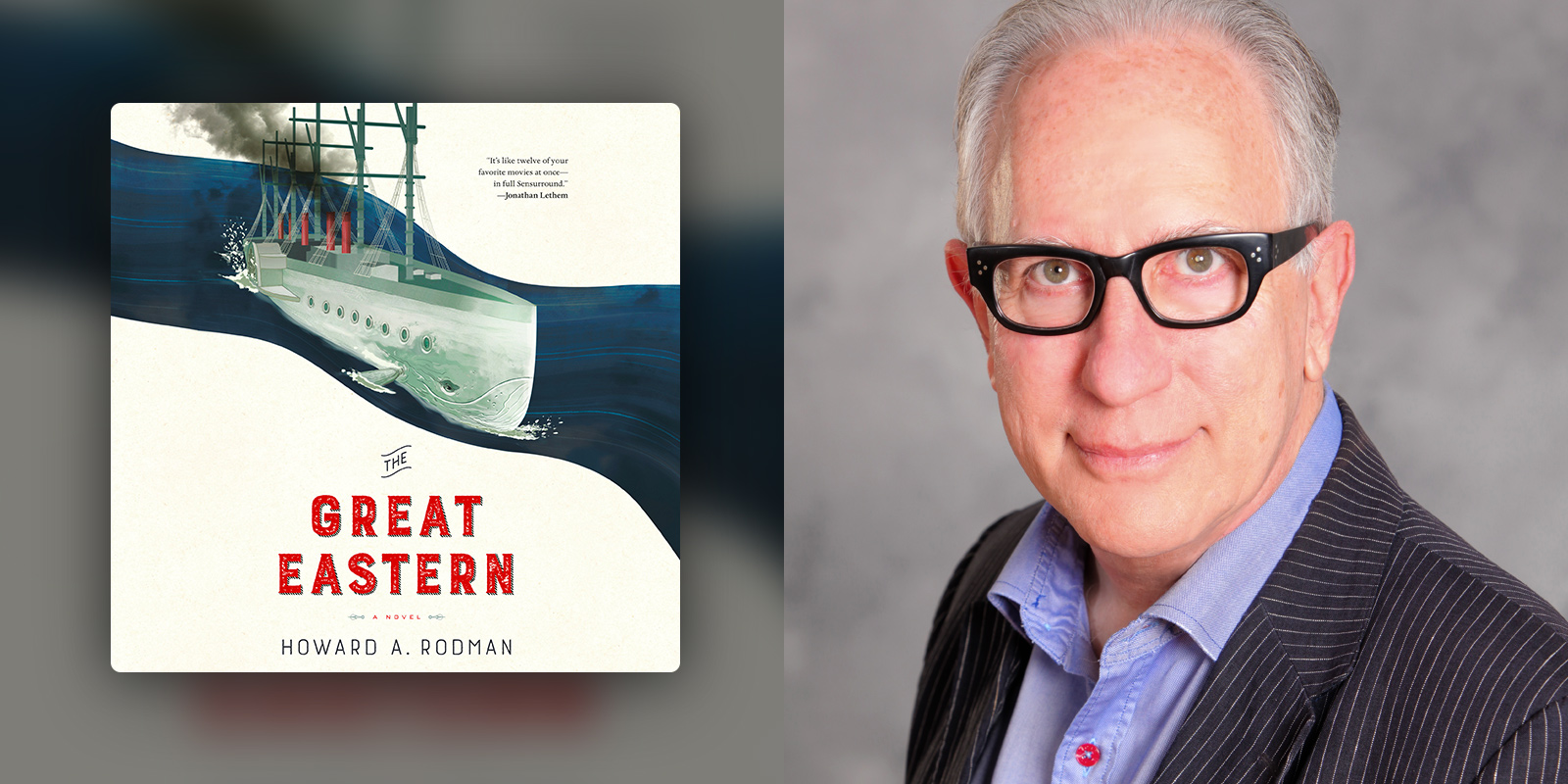
The Great Eastern is a dazzling, inventive literary adventure story in which Captain Ahab confronts Captain Nemo and the dark cultural stories represented by both characters are revealed in cliffhanger fashion. We spoke with author Howard A. Rodman about the inspiration for The Great Eastern, his favorite audiobooks, and more!
“A helluva great story.”
Jake Gyllenhaal
Please tell us a little bit about what inspired you to write this book and how this story took shape for you.
When I was a child I spent so many hours reading books under a blanket with a flashlight. I loved those authors who built a world I could inhabit—worlds I found preferable to the one outside the blanket. Jules Verne’s Twenty Thousand Leagues Under the Sea spoke to me: a contained life, beneath the sea, escaped from all civilization. You can see the appeal.
At its end the book’s hero and mine, Captain Nemo—born Prince Dakkar in Bundelkhand, India—died. But in Verne’s subsequent Mysterious Island, he lived again— And died again. So I thought: what if Nemo’s second death were as provisional as the first? Could I, by human labor, resurrect him from the dead?
And what better antagonist for Nemo than Ahab, that century’s other haunted, driven captain? What better pairing: the exiled Indian prince vs. the all-destroying but unconquering American? And who better for Nemo to press into service to build and perfect his submarine than the (very real life) Isambard Kingdom Brunel, preeminent civil engineer of Victorian England, who built the Great Western Railway, and the very first tunnel beneath the Thames, and Paddington Station, and his masterpiece the Great Eastern, six times larger than any ship previously built?
From there things began to gather coherence, then momentum. A decade later, there was The Great Eastern—a lavish, sprawling anticolonial epic beginning with the Sepoy Rebellion in India in 1857, ending with the Paris Commune of 1851.
But what The Great Eastern really is: a gift from me now to me then, a book-in-a-bottle sent back to the boy beneath the blanket. I know it would speak to him. And on a good day: help him navigate the world outside and above.
In two sentences or less, what’s something that might surprise Libro.fm listeners about your audiobook?
The Great Eastern pits against each other the two great anti-heroes of 19th-century fiction: Captain Nemo and Captain Ahab–one who lives beneath the waves and hates everything upon them, one who lives upon the waves and hates everything beneath.
Have you listened to your own audiobook? What struck you about the narration?
The Great Eastern is in many ways a Victorian novel, just written 150 years later. The narrator—the great and good Peter Noble—manages to render the voice of the book as both 19th-C and contemporary at the same time. My hat is off. The book has many voices—among them the Cambridge-educated Prince Dakkar of Bundelkhand, become Captain Nemo; Captain Ahab out of Nantucket; and the French-educated English engineer Isambard Kingdom Brunel. Rather than aim for the caricature, Noble illuminates them from within.
Are you an audiobook listener? If so, what are some of your favorite audiobooks?
I love authors possessed of a certain self-importance reading their own work: the long out-of-print LP Norman Mailer Reads Norman Mailer, and perhaps above all the audiobook The Kid Stays in the Picture, narrated by its author Robert Evans.
Other favorites include Elmore Leonard’s Mr. Paradise, narrated by the late Robert Forster; Thomas Pynchon’s Against the Day, narrated by Dick Hill; James Baldwin’s Go Tell It On The Mountain, narrated by Adam Lazarre-White; and most recently N. K. Jemisin’s The City We Became, narrated by Robin Miles.
What have independent bookstores and/or booksellers meant to you personally and professionally?
Quite simply: independent bookstores have kept me alive. I lived on the same block as Eli Wilentz’s 8th Street Bookstore in New York, and when it burned, a part of me went with it. So many of my noir tendencies come from the patient tutelage of Otto Penzler/The Mysterious Bookshop. And my love for Jules Verne was rekindled by a bookshop in Paris that sold books by Verne and no other author (!)—and in conversation with that shop’s proprietor, the late Michel Roethel, The Great Eastern was born.
Anything else to share with us?
In addition to writing books I adapt books for the screen (e.g., Joseph Mitchell’s extraordinary Joe Gould’s Secret; Natalie Robins’ & Steven M. L. Aronson’s Savage Grace). At the moment I’m adapting The Great Eastern as a television series for Great Point Media in the UK.
When I’m not writing I can be found as a professor at USC’s School of Cinematic Arts, as an artistic director of the Sundance Screenwriting Lab, and as past president of the Writers Guild of America West.
In recognition of my love for Jules Verne, for the legendary fictional arch-fiend Fantômas, for the Parisian Surrealists and Situationists, the republic of France named me a Chevalier de l’Ordre des Arts et des Lettres. It’s an honor I will spend the rest of my life working to earn.







